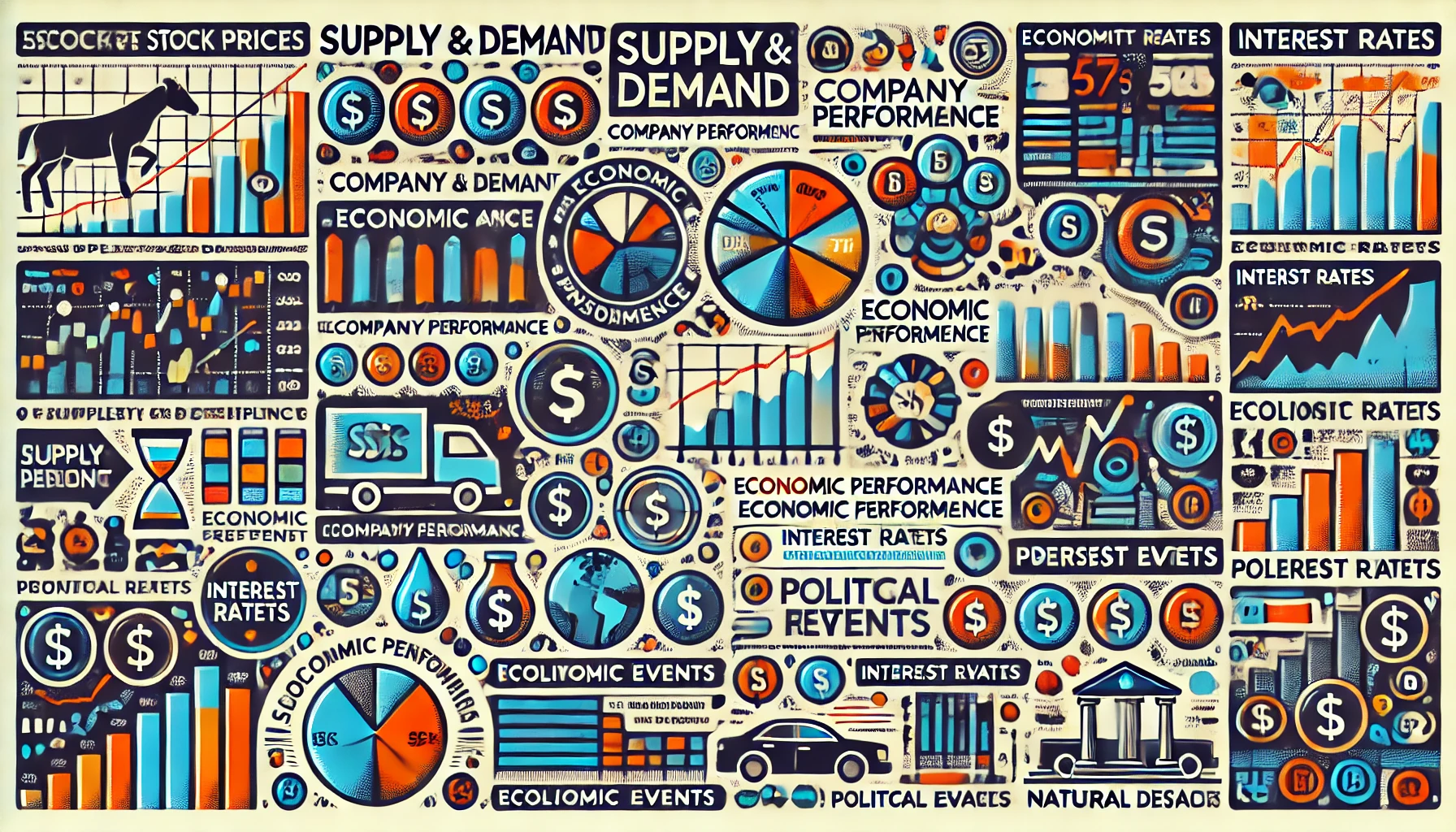Stock Prices
Understanding the factors that influence stock prices is crucial for anyone involved in the financial markets. Whether you’re a seasoned investor or just starting, knowing what drives stock prices can help you make more informed decisions. In this article, we’ll dive deep into the various factors that can affect stock prices, providing you with the knowledge to navigate the complex world of stock investing.
1. Economic Indicators
Economic indicators play a significant role in determining stock prices. These indicators provide insights into the overall health of the economy and include metrics such as GDP growth, unemployment rates, and inflation. When the economy is strong, companies tend to perform better, leading to higher stock prices. Conversely, during economic downturns, stock prices generally decline.
Example: During the 2008 financial crisis, stock prices plummeted as economic indicators showed a severe recession.
2. Interest Rates
Interest rates, set by central banks, directly impact stock prices. When interest rates are low, borrowing costs decrease, encouraging businesses to invest and expand. This typically leads to higher stock prices. On the other hand, high interest rates increase borrowing costs, potentially slowing down economic growth and resulting in lower stock prices.
SEO-Optimized Paragraph: Investors keen on understanding the factors affecting stock prices should pay close attention to interest rates. Central banks, like the Federal Reserve, often adjust interest rates to control inflation and stimulate economic growth. When interest rates are low, it creates a favorable environment for businesses to thrive, subsequently driving up stock prices. Conversely, high interest rates can stifle economic expansion, leading to a decrease in stock market performance. By keeping an eye on central bank policies, investors can better predict potential market movements.
3. Company Performance
The financial health and performance of individual companies are major determinants of their stock prices. Factors such as revenue growth, profit margins, and earnings per share (EPS) are closely monitored by investors. Companies that consistently report strong earnings and growth prospects often see their stock prices rise.
Example: Apple’s stock price surged in recent years due to its impressive revenue growth and consistent innovation.
4. Market Sentiment
Market sentiment reflects the overall mood of investors towards the stock market. It is influenced by various factors, including news events, economic data releases, and geopolitical developments. Positive sentiment can drive stock prices higher, while negative sentiment can lead to declines.
Example: The announcement of a new trade deal can boost investor confidence, resulting in a stock market rally.
5. Political and Geopolitical Events
Political stability and geopolitical events significantly impact stock prices. Elections, government policies, and international relations can create uncertainty or confidence in the market. For instance, a stable political environment can foster economic growth, leading to higher stock prices, while political turmoil can have the opposite effect.
Example: The Brexit referendum in 2016 caused significant volatility in global stock markets as investors reacted to the uncertainty surrounding the UK’s exit from the European Union.
6. Supply and Demand
The basic principles of supply and demand also apply to the stock market. When more investors want to buy a stock than sell it, the stock price tends to rise. Conversely, if more investors are looking to sell, the stock price usually falls. Supply and demand can be influenced by factors such as investor sentiment, market news, and broader economic trends.
Example: A highly anticipated product launch can drive demand for a company’s stock, pushing its price higher.
7. Technological Advancements
Technological advancements can disrupt industries and significantly impact stock prices. Companies that innovate and leverage new technologies often gain a competitive edge, leading to increased investor interest and higher stock prices. Conversely, companies that fail to adapt to technological changes may see their stock prices decline.
Example: The rise of electric vehicles has boosted the stock prices of companies like Tesla, which are at the forefront of this technological shift.
8. Industry Trends
Industry-specific trends also play a crucial role in determining stock prices. Factors such as regulatory changes, consumer preferences, and technological advancements can impact entire industries, affecting the stock prices of companies within those sectors.
Example: The growing demand for renewable energy has positively impacted the stock prices of companies involved in solar and wind power.
9. Dividends and Share Buybacks
Dividends and share buybacks are ways companies return value to shareholders. Companies that regularly pay dividends or repurchase shares often see their stock prices benefit as these actions signal financial strength and confidence in future prospects.
Example: Coca-Cola’s consistent dividend payments have made it a favorite among income-focused investors, supporting its stock price.
10. Currency Exchange Rates
For companies that operate internationally, currency exchange rates can impact their financial performance and, consequently, their stock prices. A robust domestic currency can reduce the profitability of exports, while a weaker currency can make exports more competitive.
Example: A strong US dollar can hurt the earnings of American companies that generate significant revenue overseas, potentially leading to a decline in their stock prices.
Key Takeaways
Understanding the factors affecting stock prices is essential for making informed investment decisions. Here’s a quick recap of the key points:
- Economic Indicators: Economic health impacts stock prices.
- Interest Rates: Central bank policies influence market conditions.
- Company Performance: Financial health and earnings drive stock prices.
- Market Sentiment: Investor mood can cause price fluctuations.
- Political Events: Stability or turmoil can sway the market.
- Supply and Demand: Basic economics at play.
- Technological Advancements: Innovation drives competitiveness.
- Industry Trends: Sector-specific factors matter.
- Dividends and Buybacks: Signals of financial strength.
- Currency Exchange Rates: International operations affect profitability.
Conclusion
Navigating the stock market requires a keen understanding of the myriad factors that influence stock prices. From economic indicators and interest rates to company performance and market sentiment, each factor plays a unique role in shaping market movements. By staying informed and vigilant, investors can better position themselves to capitalize on market opportunities and mitigate risks. Remember, the stock market is dynamic, and staying updated with the latest trends and data is critical to successful investing.

